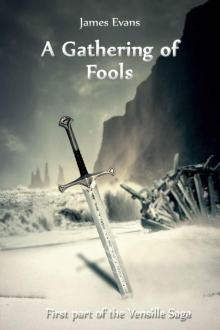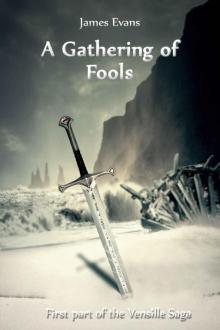- Home
- James Evans
Commando
Commando Read online
Jonathon Evans & James Evans
Commando
The Royal Marine Space Commandos
First published by Jonathon Evans & James Evans in 2018
Copyright © Jonathon Evans & James Evans, 2018
All rights reserved. No part of this publication may be reproduced, stored, or transmitted in any form or by any means, electronic, mechanical, photocopying, recording, scanning, or otherwise without written permission from the publisher. It is illegal to copy this book, post it to a website, or distribute it by any other means without permission.
This book was professionally typeset on Reedsy
Find out more at reedsy.com
Contents
Copyright
Prologue
Chapter One
Chapter Two
Chapter Three
Chapter Four
Chapter Five
Chapter Six
Chapter Seven
Chapter Eight
Chapter Nine
Chapter Ten
Chapter Eleven
Chapter Twelve
Chapter Thirteen
Chapter Fourteen
Epilogue
Thank you for Reading
Copyright
Commando
The Royal Marine Space Commandos Book One
by James Evans & Jon Evans
Find out more by clicking or visiting:
jamesevansbooks.co.uk
jonevansbooks.com
Commando is Copyright © 2018 by James Evans & Jon Evans. All rights reserved. This is a work of fiction. Any resemblance to actual persons living or dead, businesses, events or locales is purely coincidental. Reproduction in whole or part of this publication without express written consent is strictly prohibited.
Prologue
His heart pounded as he dodged and weaved, showers of earth and brick exploding around him. Ducking behind a solar array, he collapsed to the ground, gasping for air. He wrenched the rebreather from his face; a shard of plastic had buried itself in the filters, the thing was useless.
Angus could breathe the air, but it would be decades before the atmosphere was balanced. Without the oxygen from his mask, he couldn’t run for long. Or run far.
He turned his head, risking a glance around the panel. Nothing. But they were there, somewhere, getting closer with every second that he lay still. He scrabbled around, hugging the ground while he got on his front and faced himself east, away from the panel and his would-be killers. He felt like a sprinter trying to get into the blocks, and that’s what he needed to be.
There was an algal atmosphere recycler ahead of him and a moisture collector twenty metres to the north of it. The recycler was closer, but while it looked substantial, it was mostly plastic tubing and sheets, filled with a pale green mixture of algae and water. It was superb for increasing the atmospheric oxygen level but flimsy cover.
The moisture collector was a collection of turbines, metal fan blades, concrete posts and solar cells. Not sturdy as such but still a damned sight more bullet resistant than the recycler.
He made his choice and dashed forward, determined to take cover before he had to go to ground and let his heart slow down. The solar panel exploded as bullets ripped through it, scattering shrapnel that destroyed the nearby panels and drove dust high into the air.
Jones dove to his belly behind the concrete base of the moisture farm as more rounds sheared through the turbine above him with metallic screeches. At least he was on his front for the next sprint, and the concrete behind him felt like a much better shield. He lay there, sucking down the thin air while his heart rate slowed, looking desperately for his next dash.
Then he spied it, a pallet sled, left out here instead of returned to its dock at the homestead. For once that forgetful bastard Eric had done something useful, if only by accident. Jones looked wildly around. His ears were ringing from the gunfire, but he couldn’t hear his pursuers. Whoever they were, he had to move; they’d be here soon, there was no time to spare.
He crawled toward the sled, shuffling over the dusty ground as quickly as he could. The sled was low to the ground, powered by solar cells built into its flat surface and designed to haul equipment around the compound. Unlike his lungs, it didn’t run on oxygen. It might not be fast, but it was convenient, all-terrain and available.
He heaved himself onto it, pulled the control stick from the side and pressed the button. It moved slowly at first and then began to pick up speed once its sensors confirmed the load was stable. These things could match the pace of a hab vehicle, if need be, but they’d slow to a crawl if there was a risk that their load might fall off.
The speed began to mount, and Jones clung to the cargo straps, keeping flat, cheek pressed to the sled’s base. With his new-found speed, the main buildings of their hab were soon in sight. Eric must be in the workshop, Gillian was outside, tending to the greenhouses. Gillian looked up as Jones began to shout, jaw dropping when she saw him on his unusual transport.
No! Not toward me, he thought, run to the vehicles, we have to get out of here!
He shouted, as loud as he could, “Run! Get out of here! They’re coming!” but his friend couldn’t hear or didn’t understand.
He rammed the control down to the highest setting, and the sled sped up again, hurtling across the open ground. She still couldn’t hear his terrified warnings, so he got up on one knee and screamed.
The sled bounced over a bump, just a small one, but he was thrown clear, tumbling and spinning through the dust. His arms flailed uselessly until he came to a sudden stop against a mound of fertiliser. His chest heaved as he fought for breath and he winced at the sudden pain in his chest. A broken rib, maybe two, he thought as pain lanced through him.
A hundred metres to go, he staggered to his feet, running now in a low crouch with one arm wrapped around his chest. His eyes watered, his chest burned with the effort, his ribs stabbed at him. He waved his free arm and cried weakly, “Run, Gillian!”
She stopped, staring, eyes wide in confusion.
“Aliens, Gillian, for fuck’s sake, run! Invasion,” he croaked as she finally got close enough to hear.
She had known Angus Jones for years, and he had always been solid, reliable and dull. Now he was half out of his mind, raving about an alien invasion? Across all the solar systems mankind had settled, they had never encountered alien life. Perhaps he was suffering from oxygen deprivation; he had dropped his rebreather. Was he dangerous?
These thoughts and more ran through her head at lightning speed as he Jones drew near, staggering along in obvious pain. Then Angus’s skull vanished in a spray of red mist, and his body collapsed in the dust.
There was a loud crack, and her face and overalls were suddenly covered with a fine wet coating. She looked down at the blood and fragments of bone on her chest and began to scream, unable to understand what was happening.
A distant voice called out to her, asking if she was alright. Eric never got an answer. As he came out of the workshop, wiping his hands on a cloth, he saw Gillian standing there, screaming her head off. Then her head was gone, and Eric screamed too.
* * *
“Get the wormhole channel open, now!” Governor Denmead shouted as she crouched behind the concrete wall of the balcony, looking down the sight of her rifle and scanning for the enemy. The sound of fully automatic gunfire could be heard in the distance. That had to be the enemy. The sporadic single shots were the colonists, fighting for their lives with light rifles, mining lasers and sheer bloody-mindedness.
“Governor,” her aide, Johnson, shouted from the office, “we’re through!”
Denmead saw movement, a bulky figure aiming a large weapon around a habitat in the distance.
“Be right with you,” she murmured. She squeezed the trigger slowly as she steadied her breath and aimed, there was a crack, and the rifle bucked in her hand. It was a good shot, the enemy took the round in the neck rather than right between the eyes, but he fell back out of view all the same. These low calibre semi-automatic rifles were issued to all new colonies to keep any local wildlife at bay or deal with the rare instances of banditry or maybe even a small riot. They weren’t intended for armoured opponents wielding good-quality military gear. For that, they needed the Royal Marines.
She scrambled back into the office and slid behind the desk with Johnson. It wasn’t dignified, but then neither was finding out the hard way that an enemy sniper had found a perch with a view through the windows of City Hall.
“This is Governor Denmead. Who am I speaking to?”
“Sergeant Wainwright, Governor. Please verify your ID and explain the situation,” the man on the screen said calmly.
“We’re under attack,” Denmead began as she put her palm on the scanner.
“ID authenticated, Governor. What kind of attack? Civilian, pirates, corporate?” the Sergeant asked, cool as a cucumber.
“I don’t fucking know,” she yelled, her self-control slipping momentarily as staccato series of bangs made the desk judder, “they started attacking outlying areas of New Bristol several days ago, and we didn’t hear immediately because they killed everyone at those sites. Now they’re attacking Ashton, and we’re losing a lot of people. They have armour and military grade weaponry. That’s as close as we’ve got to identifying them,” she said.
“Do you require assistance from 42 Commando ma’am?” the Sergeant asked.
She almost lost her rag at that point, “Yes we require some fucking assistance! You need to activate the Marines immediately and get the fleet on its way!”
“How many enemy combatants are there, ma’am?” Wainwright asked.
Gunfire erupted from outside, and a few rounds bounced off the walls of the building, the enemy was getting closer.
“We don’t know. We’ve killed a few but more keep coming. They’re pushing us back all the time. Did you hear that gunfire?”
“Yes, Ma’am.”
“They’re just outside my office, we need to move before this area is overrun,” Denmead yelled over the noise outside.
“Very well, Ma’am. Get yourself somewhere safe. I’ve requested the activation of the Marine clones in New Bristol. Please re-establish contact with us as soon as you are secure. Your request for Naval deployment has been noted. If we can get more detail, it would help make your case, Governor. The Navy is only deployed if a major threat is confirmed. Good luck, Governor. 42 Commando HQ, signing off,” Wainwright said before cutting the signal.
“Help our case?” she groaned as her eyes met Johnson’s. He looked panicked. She probably did too. At least they would soon have help from military-grade clones, the Royal Marine Space Commandos that were issued to every new colony. They would help the colonists of New Bristol fight back. She just wasn’t sure it would be enough.
Chapter One
Atticus snapped awake, the first breath tasting like fresh mountain air in his new lungs. For a moment, all was calm and peaceful. Then a dull crump rattled the building and brought dust from the ceiling. Time to go to work.
As he rolled to his feet, he was already reviewing the briefing installed while the pod had been bringing him round. An attack, assailant unknown, on a New British Empire colony planet.
Atticus checked his clock chip; twenty-four minutes had elapsed between Governor Denmead’s call for help and his company being injected via wormhole. It had taken a further six hours to decant their bodies. Almost a record turnaround. Whatever this was, it was being taken seriously.
He dressed quickly as around him the rest of the command team and A Troop of Company 971, 42 Commando, pushed themselves from their pods. Secure lockers disgorged combat gear, and within minutes his team was fully equipped, ready to face whatever was waiting.
“Sound-off,” called Atticus, issuing the command audibly and as text into his combat HUD. His command team and A Troop called in with practised efficiency, their names appearing on the ID strips on their uniforms and in their HUDs.
Atticus nodded, content, as more explosions shook the building.
“Nothing from B Troop,” said Colour Sergeant Stephanie Jenkins, “could be a comms problem.” That was optimistic, and Jenkins knew it. The comms kit was ultra-reliable, battle-tested over more worlds than she could count. A Troop knew it as well and fell silent as they processed the implications.
“Assume nothing,” murmured Atticus, checking his weapons one last time before giving the order to move out.
Weapons raised, A Troop climbed the stairs and fanned out into the corridors above the emergency deployment bay. Their HUDs showed a map of the compound with blinking blue dots for civilians and red for invaders, the information drawn from sensors all over the colony.
Worryingly large parts of the map were shaded grey where sensors had failed or lost contact.
“Captain, at last,” came a new voice, tense with worry but flooded with relief, “I’m Governor Denmead. Please, this way.”
“Captain Atticus, Governor. This is Lieutenant Warden. Can you update us? There was no detail in the briefing,” he asked.
“Good to meet you, despite the circumstances,” she replied as they followed her along a corridor that led out of the building.
“Governor, we can’t reach the second EDB on comms. Do you have any idea what its status is?” Atticus asked.
Governor Denmead shook her head, “I’m sorry, no. We’ve lost parts of Ashton’s sensor grid, and there are system failures elsewhere. We don’t have an up-to-date picture of the intact buildings. We’re just trying to survive.”
“Understood. Warden,” said Atticus, “get to the second EDB, find B Troop, rendezvous when you can. Take Wilson in case there’s a tech problem with the pods themselves.”
“It’s off to your west, or at least, that’s where we built it, Lieutenant,” the Governor said as they exited the building into the thin air of New Bristol.
“Thank you, Governor. Sir,” said Lieutenant Warden, “Section 1 with me.” He led them away at a swift trot, following the directions in his HUD for the location of the second marine deployment facility.
Atticus and the rest of A Troop followed Denmead through the compound towards the fighting. As they ran, she gave a quick description of all that had happened.
At the edge of the building they paused. Beyond, across a short stretch of open ground, stood City Hall.
“So fast, Captain, it was so fast,” said the Governor as she shrugged her weapon from her shoulder.
“How many of them, ma’am?” asked Atticus as he stared across the city, searching for the enemy.
“Scores at least, Captain, possibly hundreds. Our dead…” she trailed off. The bodies were piling up; their numbers tracked in Atticus’s HUD as their signals went offline, one after the other.
“How are the attackers armed?”
“Automatic rifles, snipers, grenade launchers I think. I haven’t seen rail guns or lasers. We’ve been fighting them as best as we can, pulling the children back and just trying to hold them off but we have,” she paused, holding up her rifle, “limited options,” she said, almost apologetically.
Atticus nodded, “Right, get to your command post and try and pull your people back. We’ll be laying down heavy fire, and I don’t want them getting caught in it. Hughes, go with the Governor and make sure the comms are working properly.”
“Sir!” Hughes barked in acknowledgement as he turned and followed the Governor.
There was a burst of gunfire from somewhere beyond City Hall. Outside, firing towards the Hall, according to their HUDs. Atticus signalled his troops forward, leading them out onto the open ground and quickly across.
“Campbell take Section 2, inside, sweep the building, head for the front. Secti
on 3, with me, we’ll flank them around the east of the building.”
Atticus headed for the corner of the building and the dusty parkland beyond it. Section 3 followed him as Section 2 triggered the door controls and disappeared into the building. Atticus paused briefly as Section 3 flowed smoothly around the edge of the building, seeking the enemy. He watched their indicators, and those of Section 2, moving steadily across the map in his HUD.
Then he hefted his rifle and followed his troops, Jenkins and Butler alongside.
Chapter Two
Atticus crouched behind a chest high concrete wall atop a squat building that housed what Governor Denmead assured him were dangerous, but not explosive, chemicals. Terraforming required sweeping, long-term changes to the atmosphere and soil of a planet. In the short term, what the colonists needed was massive hydroponic systems packed with the best nutrients chemistry could refine.
There were dozens of buildings like this across the city, all storing different resources that had been shipped in by unmanned supply craft before colonists arrived or else were being manufactured locally by the extraction plants they’d installed.
Powered armour and surveillance drones had changed the face of the battlefield but having a high vantage point from which to observe the enemy was still helpful. Atticus especially liked having two feet of brutally ugly concrete wall between him and the enemy. The building might be austerely functional, but the colonists had covered it with green matting, sunbeds and chairs. Not that there was much weather to enjoy, he supposed, but it was no worse than the average British seaside town.

 The Royal Marine Space Commandos- RMSC Omnibus
The Royal Marine Space Commandos- RMSC Omnibus Guerrilla
Guerrilla Commando
Commando Gunboat
Gunboat A Gathering of Fools (Vensille Saga Book 1)
A Gathering of Fools (Vensille Saga Book 1) A Gathering of Fools
A Gathering of Fools Zombie Destruction: Love in the Age of Zombies Book Three
Zombie Destruction: Love in the Age of Zombies Book Three